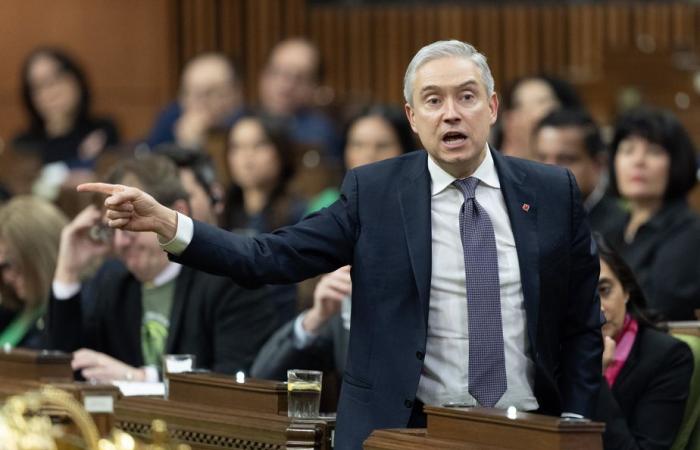Tension is growing between Cogeco and Telus, two competitors awaiting an important decision from the regulator to come at the start of the year surrounding the resale of internet services.
Published at 6:00 a.m.
The CEO of Cogeco, Frédéric Perron, denounces the campaign that Telus has just launched, calling it propaganda.
Since the end of November, Telus has been calling on Canadians to sign a petition to challenge the federal government's decision last month to ask the Canadian Radio-television and Telecommunications Commission (CRTC) to reassess the possibility of Telus offering fiber internet services optics in Quebec and Ontario under current rules allowing access to competitor networks, notably that of Cogeco.
In a statement in November, Canadian Industry Minister François-Philippe Champagne expressed concern about the viability of small ISPs offering alternative solutions and about continued investment in internet infrastructure. He gave the CRTC 90 days to re-examine the situation.
PHOTO ADRIAN WYLD, CANADIAN PRESS ARCHIVES
Canadian Minister of Industry, François-Philippe Champagne
The CRTC previously said in August that operators were considered “new competitors” with the potential to disrupt the status quo for the benefit of consumers when they operate outside their territory.
The regulator had cited an opinion from the Competition Bureau that the benefits of allowing wholesale high-speed access services likely outweigh the risks.
One argument raised in favor of a review is that the CRTC did not properly consider the long-term effect of bundling by large operators, as smaller players do not offer wireless services, which which can disadvantage them.
Frédéric Perron adds that Telus is taking advantage of a loophole in the regulations allowing large operators to access the networks of their smaller competitors.
The third-party internet access scheme was not designed for use by large providers, he says.
According to Frédéric Perron, the CRTC must fill this gap so that the regime works as it was initially supposed to.
In recent years, large operators have bought up smaller providers that used the networks of other regional players by taking advantage of wholesale internet rules. Today, they belong to the big three, says the boss of Cogeco, and still benefit from these rules.
Frédéric Perron maintains that for a regional provider like Cogeco, this means that nearly 50% of consumers who use its network through the regulated wholesale internet service access regime are in fact customers of large operators.
Telus, for its part, asks the CRTC to maintain the status quo and maintains that the request made by the federal government to the CRTC creates uncertainty for consumers in addition to threatening the “progress” made by Telus thanks to its internet service and its bundles integrating mobile services, entertainment, home automation, security technologies, etc.
“This propaganda from Telus is complete nonsense,” says Frédéric Perron.
Telus presents itself as a new competitor for internet services in many regions of Quebec and Ontario, which irritates Frédéric Perron. “Who doesn’t know Telus? They are already present. They have cellular network. He's not a new player. »
Second, he adds, Telus claims it can lower prices. “But prices are falling in the East and rising in the West, where Telus operates a network,” said the Cogeco boss without further specifying his statement.

PHOTO FRANÇOIS ROY, LA PRESSE ARCHIVES
Frédéric Perron, CEO of Cogeco
It is not by crushing a player like Cogeco that Telus will help the competition in the long term. This is dishonest propaganda showing that Telus has big marketing budgets to crush us.
Frédéric Perron, CEO of Cogeco
At Telus, regional vice-president of marketing, Nathalie Dionne, responds that Telus is a new competitor for the internet in the east of the country.
“We are well known in mobility, but the fact remains that we offer internet in few territories in Quebec. We are really an emerging player in Quebec and Ontario. Being able to enter these territories allows us to serve customers with more service bundling options, allowing for more savings and choice,” she said, specifying that the CRTC has established clear rules regarding prices for resale taking into account the costs for infrastructure operators.
In an intervention document before the CRTC dated December 12, Telus maintains that its share of the internet market in Ontario and Quebec is less than 4%, which places it behind Bell, Rogers, Videotron, Cogeco and TekSavvy .
“It’s not viable for it to become an open bar,” says Frédéric Perron. It's no longer worth the investment to connect homes and maintain a network if everyone else can use it. »
The future of the Internet in the country is linked to the decision that the CRTC will make this winter, according to him.
“The CRTC rules were not designed to encourage the expansion of large providers, but rather to encourage competition, and it is not by crushing players like Cogeco and Eastlink that Telus will help competition in the long term . Everyone agrees, except Telus,” he says.
Frédéric Perron affirms that the threat is existential for Cogeco.
“This is a huge risk for the sustainability of regional players. We have carried out financial analyzes which show that we would lose significant market shares if the situation does not change. It would hurt financially. Telus is only beginning to exploit the flaw in the system,” says Frédéric Perron.








